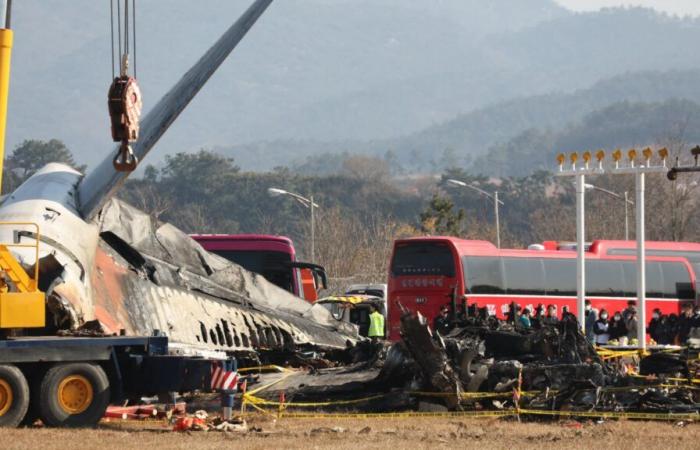On December 30, the crash of a Boieng 737-800 caused the death of 179 people in Muan, South Korea. A South Korean government official announced on Wednesday that the two black boxes had been recovered and that investigators had extracted initial data.
Investigators working on the crash of a Jeju Air plane, which left 179 dead in South Korea, have extracted the first data from one of the black boxes of this Boeing 737-800, announced this Wednesday 1st January a government official.
The South Korean low-cost carrier's plane was carrying a total of 181 people, including six crew members. All died, except for a flight attendant and a steward, making it the worst air disaster in history on South Korean soil.
South Korean and American investigators, notably from Boeing, are combing the site of the accident which occurred Sunday morning in Muan (southwest).
The second black box “found with a missing connector”
The two black boxes have been recovered. “The initial extraction has already been completed” regarding the one containing the cockpit conversations, said Joo Jong-wan, vice minister in charge of aviation.
“Based on this preliminary data, we plan to start converting it to audio format,” he added. This should allow investigators to hear the pilots' latest communications.
The second black box, the flight data recorder, “was found with a missing connector,” Joo Jong-wan said.
“Experts are currently conducting a final review to determine how to extract the data.”
The trail of a collision with birds
The plane, coming from Bangkok, landed on its belly before crashing at high speed into a wall at the end of the runway. Under the force of the impact, the device bent in two and caught fire.
The possibility of a collision with birds, a fear of pilots, was mentioned to explain the accident. The Muan airport control tower had sent a warning to this effect to the plane's crew three minutes before the crash. The pilot had sent him a distress message before the emergency landing.
Jet engines can lose power or even stop completely after sucking in a bird.
Critics, however, focus on the architecture of the airport and in particular on the presence of the obstacle hit by the plane.
On Tuesday, South Korea announced that it would examine the conformity of this concrete wall which was at the end of the runway.
The question of a hardware malfunction was also raised, with local media reporting that the landing gear deployed correctly when the pilot attempted to land the first time but did not extend on his second attempt. essay.
Videos show the plane making an emergency landing with the landing gear retracted and the flaps not extended.
The question “will probably be examined (…) with a complete review of the various testimonies and evidence”, explained the Ministry of Regional Planning, which supervises civil aviation, during a press briefing.
“Complete analysis”
At Muan airport, bereaved families are increasingly frustrated by the slow process of handing over remains.
The bodies were badly damaged by the accident, making identification work extremely difficult, authorities said, as investigators struggle to preserve clues at the crash site.
The new interim president, Choi Sang-mok, who took office last week, announced on Wednesday that “overnight, the process of identifying the 179 victims was completed.”
“Our investigators, as well as the US National Transportation Safety Board and the manufacturer, are conducting a joint investigation,” Choi Sang-mok said on Wednesday during a meeting on disaster management.
“A comprehensive analysis and review of the aircraft structure and (black box) data will reveal the cause of the accident,” he said.
The first on-site investigations focused on the locator, this landing assistance system present at other airports in the country and which, in Muan, was installed on the concrete wall in question.
The plane was mainly carrying tourists returning from a stay in Thailand. All passengers were Korean nationals, except for two Thais.
Altars in memory of the victims have been erected across the country, including in Seoul and at Muan Airport.






